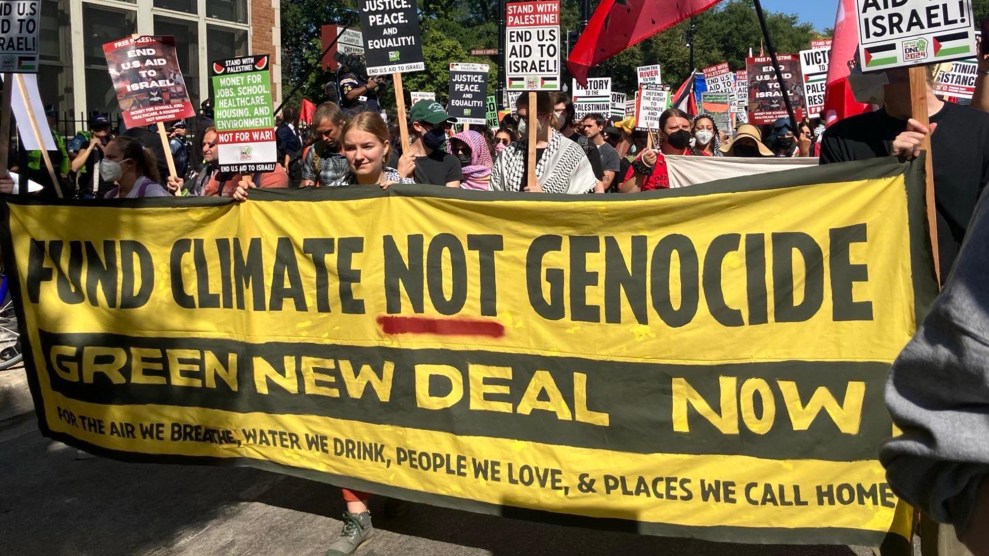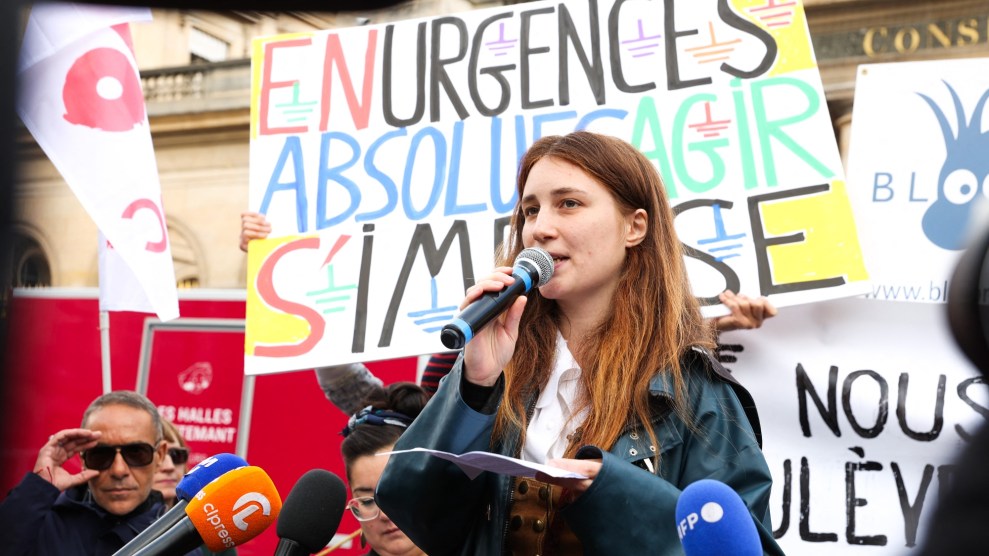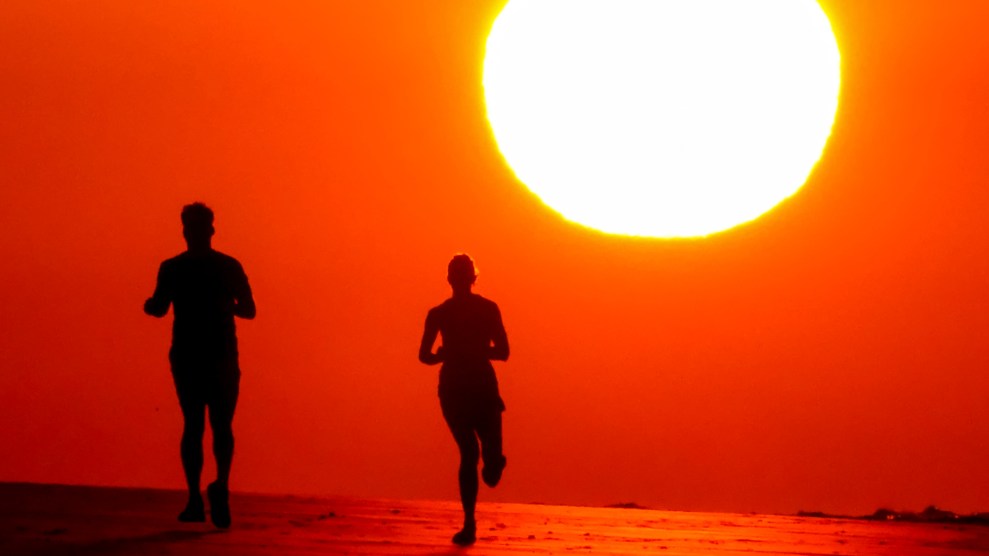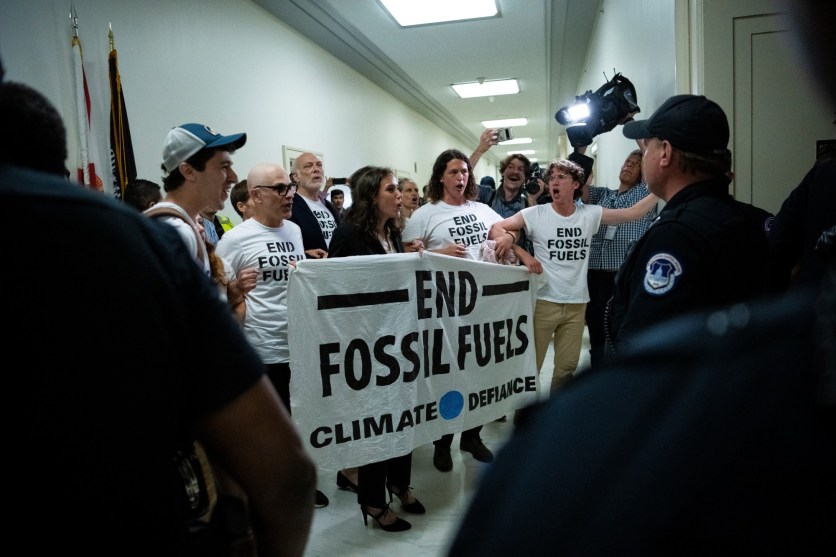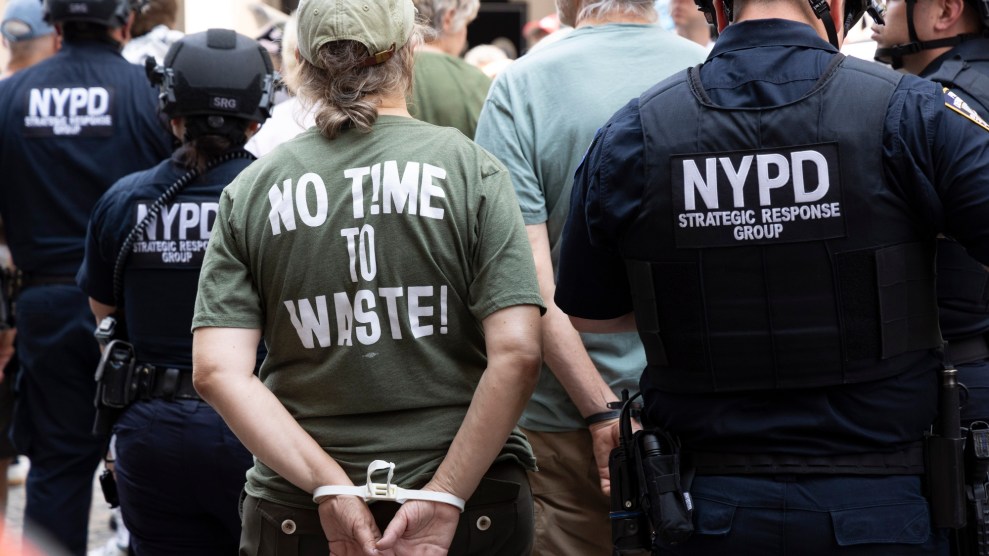
NYPD officers arrest climate protesters outside the Tribeca home of Citibank CEO Jane Fraser in July.Gina M Randazzo/ZUMA
This story was originally published by the Guardian and is reproduced here as part of the Climate Desk collaboration.
Wealthy, democratic countries in the global north are using harsh, vague, and punitive measures to crack down on climate protests at the same time as criticizing similar draconian tactics by authorities in the global south, according to a report.
A Climate Rights International report exposes the increasingly heavy-handed treatment of climate activists in Australia, Germany, France, the Netherlands, Sweden, the UK, and the US.
It found the crackdown in these countries—including lengthy prison sentences, preventive detention and harassment—was a violation of governments’ legal responsibility to protect basic rights to freedom of expression, assembly, and association. It also highlights how these same governments frequently criticize regimes in developing countries for not respecting the right to protest peacefully.
“Governments too often take such a strong and principled view about the right to peaceful protest in other countries—but when they don’t like certain kinds of protests at home they pass laws and deploy the police to stop them,” said Brad Adams, director at Climate Rights International.
Across Europe, the US, and the UK, authorities have responded to nonviolent climate protests with mass arrests and draconian new laws that have resulted in long prison sentences. In some instances people who have taken part have been labeled as hooligans, saboteurs, or ecoterrorists by politicians and the media.
Senior human rights advocates and environmental campaigners have raised concerns about the crackdown and called on governments to protect the right to nonviolent protest.
“These defenders are basically trying to save the planet, and in doing so save humanity,” Mary Lawlor, the UN special rapporteur on human rights defenders, told the Guardian last year. “These are people we should be protecting, but are seen by governments and corporations as a threat to be neutralized. In the end it’s about power and economics.”
The escalating climate crisis has resulted in record-breaking temperatures around the world in 2024, driving food shortages, mass movements of people and economic hardship – as well as deadly fires and floods.
But the report found that rather than taking urgent measures to rapidly reduce the use of fossil fuels and halt ecological collapse, many relatively wealthy countries have instead focused on those trying to stop those raising the alarm by taking part in protests and civil disobedience.
“You don’t have to agree with the tactics of climate activists to understand the importance of defending their rights to protest and to free speech,” said Adams. “Instead of jailing climate protesters and undermining civil liberties, governments should heed their call to take urgent action to address the climate crisis.”
The report’s authors highlighted several examples of developed countries lauding the importance of the right to protest on the international stage at the same time as undertaking harsh and punitive crackdowns at home.
Welcoming a UN report in July this year, the UK government said: “These rights [to peaceful assembly and protest] are essential to the functioning of society, providing a platform for citizens to advocate for positive change. Nonetheless, civic space is increasingly contested as authoritarian governments and actors, who feel vulnerable to scrutiny and accountability, seek to silence dissent.”
Tuesday’s report also found:
- Record prison sentences for nonviolent protest in several countries including the UK, Germany and the US.
- Preemptive arrests and detention for those suspected of planning peaceful protests.
- Draconian new laws passed to make the vast majority of peaceful protest illegal.
- Measures to stop juries hearing about people’s motivation for taking part in protests during court cases, which critics say fundamentally undermines the right to a fair trial.
Climate Rights International called on democratic governments around the world to halt the authoritarian crackdown and protect people’s rights to protest.
“Governments should see climate protesters and activists as allies in the fight against climate change, not criminals,” said Adams. “The crackdown on peaceful protests is not only a violation of their basic rights, it can also be used by repressive governments as a green light to go after climate, environmental, and human rights defenders in their countries.”
